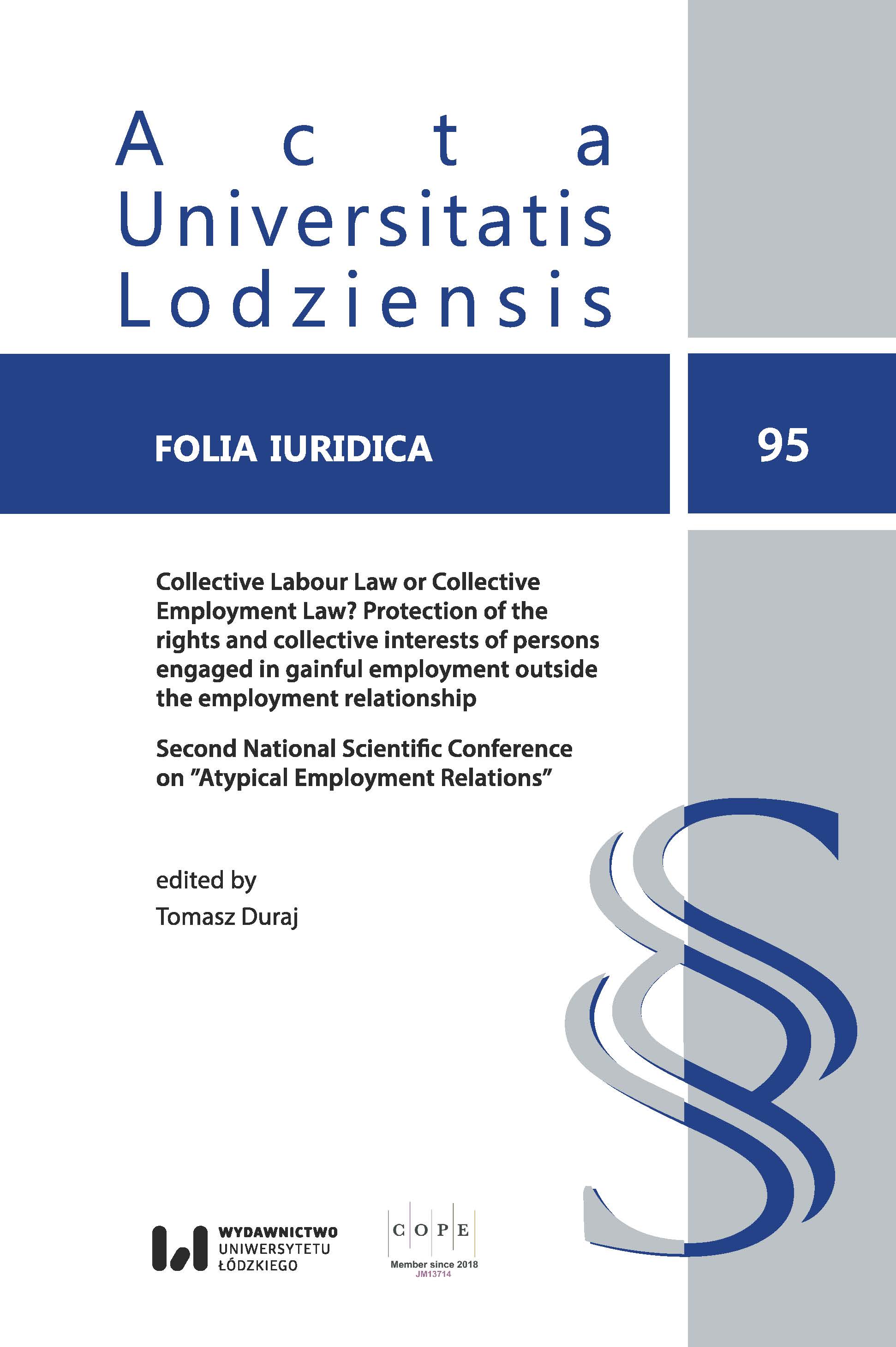The Issue of Representativeness in the Lights of the Amended Trade Unions Act
DOI:
https://doi.org/10.18778/0208-6069.95.04Keywords:
trade union, representativeness above the workplace level, representativeness at the workplace level, the size of the trade unionAbstract
The subject of the deliberations are issues regarding the representativeness and size of workplace trade union organisations after the changes introduced in the Trade Unions Act in 2018. According to the obligatory provisions, the “representativeness” of a trade union organisation is traditionally conditional on its size, but not only the employees, but also other categories of the employed are taken into account. It is, inter alia, about persons providing work under a contract of mandate or a specific work contract and sole proprietors. By expanding the full rights of coalition onto persons performing work on the basis other than employment relationship, the legislator increased the percentage limits decisive in the matter of representativeness. At present, the representative trade union organisation above the workplace level is also an organisation uniting at least 15% of all people performing gainful work under the articles of association, not fewer, however, than 10,000 persons performing gainful work. It works similarly at the workplace level. With reference to workplace trade union organisations which belong to organisations above the workplace level which meet the criteria for representativeness as specified in the Social Dialogue Council Act, at least 8% of the staff of the given employer is required. In the case of workplace trade union organisations which do not participate in such structures, the representativeness is conditional on uniting of at least 15% of persons performing gainful work for the given employer (7% and 10%, respectively, were required earlier). Determining the number of the staff, the employees and persons providing gainful work under other bases being employed for at least 6 months before the commencement of negotiations or arrangements must be included. A significant novelty is the necessity to select a joint representation of the representative organisations at the workplace level that belong to the same Trade Union Federation or National Trade Union Confederation in matters regarding collective rights and interests of the persons performing gainful work.
Downloads
References
Freedom of Association. Compilation of Decisions of the Committee on Freedom of Association. 2018. Geneva: International Labour Office.
Google Scholar
Goździewicz, Grzegorz. 2000. Ed. “Podstawowe zasady zbiorowego prawa pracy”. In Zbiorowe prawo pracy w społecznej gospodarce rynkowej. Toruń: TNOiK.
Google Scholar
Hajn, Zbigniew. 2013. Zbiorowe prawo pracy. Zarys systemu. Warszawa: Wolters Kluwer.
Google Scholar
Książek, Daniel. 2019. In Zbiorowe prawo zatrudnienia. Komentarz. Edited by Krzysztof W. Baran. 137–139. Warszawa: Wolters Kluwer.
Google Scholar
Latos-Miłkowska, Monika. 2007. “Reprezentatywność w zbiorowych i indywidualnych stosunkach pracy”. In Zbiorowe a indywidualne prawo pracy. Edited by Ludwik Florek. 146. Warszawa: Wolters Kluwer.
Google Scholar
Latos-Miłkowska, Monika. 2019. “Reprezentatywność zakładowych organizacji związkowych po nowelizacji ustawy o związkach zawodowych – nowa jakość czy stracona szansa?”. Praca i Zabezpieczenie Społeczne 5: 28–35.
Google Scholar
DOI: https://doi.org/10.33226/0032-6186.2019.5.5
Lekston, Mariusz. 2019. In Zbiorowe prawo zatrudnienia. Komentarz. Edited by Krzysztof W. Baran. 141–154. Warszawa: Wolters Kluwer.
Google Scholar
Masewicz, Walery. 1993. “Reprezentatywność jako cecha związku zawodowego (na przykładzie NSSZ ‘Solidarność 80’)”. Praca i Zabezpieczenie Społeczne 5–6: 17–24.
Google Scholar
Pliszkiewicz, Marek. Michał Seweryński. 1995. “Problemy reprezentatywności w zbiorowych stosunkach pracy”. Państwo i Prawo 9: 3–4.
Google Scholar
Rączka, Krzysztof. 2008. In Kodeks pracy. Komentarz. Edited by Małgorzata Gersdorf, Krzysztof Rączka, Jacek Skoczyński, Zbigniew Salwa. 882. Warszawa: Wydawnictwo Prawnicze LexisNexis.
Google Scholar
Sanetra, Walerian. 1994. Prawo pracy. Białystok: Temida 2.
Google Scholar
Sanetra, Walerian. Józef Iwulski. 2011. Eds. Kodeks pracy. Komentarz. Warszawa: Wydawnictwo Prawnicze LexisNexis.
Google Scholar
Szmit, Jakub. 2019. “Reprezentatywność zakładowej organizacji związkowej w świetle nowelizacji ustawy o związkach zawodowych”. Praca i Zabezpieczenie Społeczne 3: 28–32.
Google Scholar
DOI: https://doi.org/10.33226/0032-6186.2019.3.4
Świątkowski, Andrzej M. 2013. “Obowiązek władz państwowych promowania rokowań w sprawie układów zbiorowych pracy”. In Układy zbiorowe pracy. W stulecie urodzin Profesora Wacława Szuberta. Edited by Zbigniew Góral. 95–130. Warszawa: Lex a Wolters Kluwer business.
Google Scholar
Świątkowski, Andrzej M. 2014. In System prawa pracy. T. V. Zbiorowe prawo pracy. Edited by Krzysztof W. Baran. Warszawa: Lex a Wolters Kluwer business.
Google Scholar
Walczak, Krzysztof. 2018. “Pojęcie reprezentatywności związków zawodowych w świetle nowelizacji ustawy o związkach zawodowych”. Studia z Zakresu Prawa Pracy i Polityki Społecznej 3: 223–241.
Google Scholar
Wratny, Jerzy. 2012. “Problem reprezentatywności związków zawodowych w zakładzie pracy. Więcej pragmatyzmu czy demokracji”. Praca i Zabezpieczenie Społeczne 3: 2–9.
Google Scholar
Downloads
Published
How to Cite
License

This work is licensed under a Creative Commons Attribution-NonCommercial-NoDerivatives 4.0 International License.














